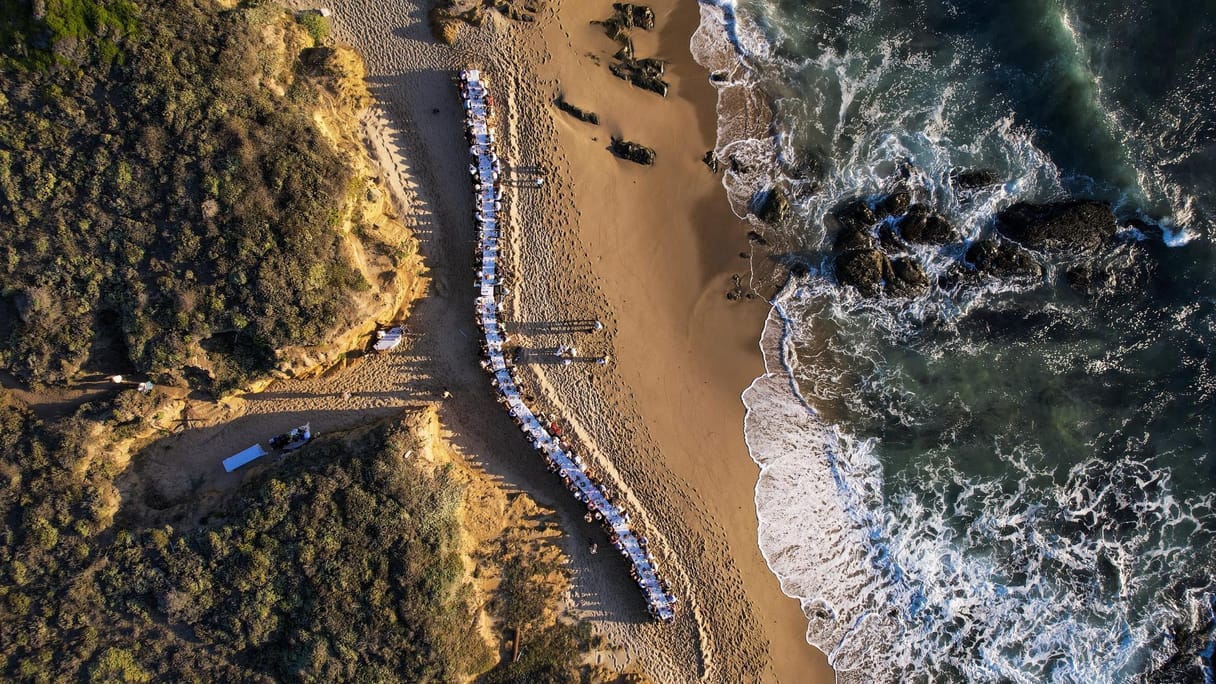How Jim Denevan builds unforgettable hospitality in the wild
Creating experiences and leveraging nature, Outstanding in the Field serves up unforgettable dining.
• public
A version of this story first appeared in The Prep newsletter. To get it in your inbox, sign up for free by clicking here.
By Lesley McKenzie | The Prep
Artist Jim Denevan first sparked a culinary revolution in 1999 by bringing dinner tables to farms, beaches, and vineyards through Outstanding in the Field, a traveling dining concept that reconnects people with the origins of their food. Over the years, what began as a radical communal table has matured into something even more essential: guests are no longer content with the thrill of the experience alone.
"Now, people crave even deeper connection," says Denevan, who sat down with The Prep to chat about experiential dining. "The hunger is for meaning and memory, not just novelty. With authenticity grounded in place, people and purpose, this ethos shapes every event—and lies at the heart of our conversation today."
You’ve set tables in deserts, vineyards, and cliffside pastures. How do you even begin to turn these wild locations into a working restaurant for the night?
Much like when I begin an artwork, I usually start by listening and observing our surroundings. I’ll walk the site by myself, watching how the light moves. I’m guided by the idea that the table should feel like it’s always belonged to this place, even if just for one night.
The placement of the kitchen is designed to lend an element of theatricality, placing the chef and their team in view of guests as they prepare the meal.
We bring only what’s essential and our team works from sunrise, hauling, building, and arranging elements to create a back of house that enables a level of service that rivals any fine dining establishment–including a scullery tent, the kitchen equipment, even the water. Very often we set up in places where there’s no electricity or running water. Every site has its own challenges—wind, weather, uneven ground—but that’s part of the adventure. We embrace the unpredictability. Sometimes the best moments come from the unexpected: a rainbow after a light rain, a rogue bison.
For hospitality pros thinking about launching their own immersive experiences, what’s the first step to translating a brand story into something guests can actually feel?
For us, it’s connection: to the land, to food, to each other, so lean into creating a sense of place. It’s one thing to eat the food from a particular place, but another to touch the dirt that grew the produce, listen to the birds, or share a meal with the farmer who grows the grapes for your wine.
I would advise hospitality pros to similarly start with their “why.” Before a single table is set, you need to know the story you want to tell and what you want guests to feel. Every detail—where guests walk, what they touch, who they meet—should echo that purpose. Don’t just talk about your brand’s values; embody them in every gesture, from the welcome handshake to the way the meal is served.
You’re constantly working with different chefs, teams and terrains. How do you keep the experience consistent?
We have a dedicated culinary liaison who supports each chef and ensures the successful execution of their culinary vision in a field kitchen setting, but I find that consistency comes from clarity of purpose, not from rigid rules. We invite chefs and teams to bring their own creativity, but always within the frame of our guiding principles: respect for the land, celebration of local ingredients, and the communion of the table. The table is always long, the meal always shared and the spirit always welcoming.
From farms to flavor partners, what makes a collaboration click? And what have you learned about saying yes or no to potential partners?
A great collaboration starts with shared values and genuine curiosity. We look for partners—farmers, chefs, artisans—who are passionate about their craft and open to seeing how we can create a special moment for our guests. The best partnerships feel like a conversation, not a transaction. Saying no is just as important; if the fit isn’t right, the magic won’t happen. We’ve learned to trust our instincts and to honor the integrity of what we do, even if it means walking away.
Thanks for reading today's edition! You can reach the newsletter team at editor@theprep.co. We enjoy hearing from you.
Interested in advertising? Email us at newslettersales@mvfglobal.com
Was this email forwarded to you? Sign up here to get this newsletter once a week.
The Prep is written by Julien Perry and edited by Lesley McKenzie.
